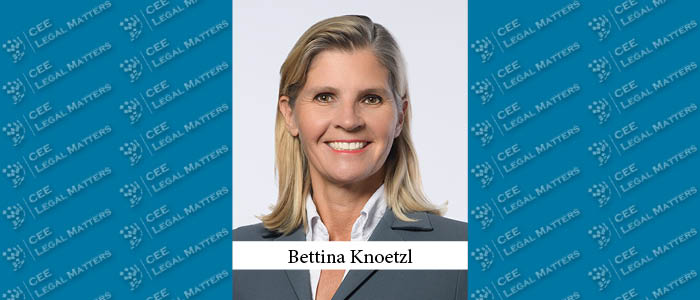Austria’s real estate business currently faces multifaceted challenges following the unexpected rise of interest rates and inflation in 2022, according to Knoetzl Partner Bettina Knoetzl, with “the SIGNA Holdings insolvency sending shockwaves throughout the industry and the country.”
“This is neither the first, nor the last bankruptcy prospect in Austria’s real estate sector, but it likely is the biggest,” Knoetzl begins. She explains that the SIGNA group has been “a major real estate player, based in Austria, and led by real estate tycoon Rene Benko.” It is not only known for its successful and stunning developments in Vienna, like the Golden Quarter (Goldenes Quartier), according to her, “but also across Austria’s borders. Some prominent examples include, in Germany, the SIGNA group-owned ‘Galeria’ retail chain with more than 70 outlets and, in the US, the acquisition of the famous Chrysler Building.”
For the legal industry, the current economic environment means an unusually high demand for lawyers in restructuring, insolvency, and crisis management. Moreover, Knoetzl notes, “commercial litigation, asset recovery, and white-collar-crime practitioners got a big boost from real estate businesses in distress. And for the disposition of assets by insolvency administrators, deal lawyers are in demand.” Legislative reforms are under consideration, she says, “to protect creditors from the past mistakes that have burned them recently, in the context of SIGNA’s collapse.” Still, she warns latecomers: “It's become challenging to find experienced insolvency trustees and law firms in Austria who are still free to act without conflicts.”
Only last November, SIGNA Holding had to file for restructuring proceedings, hoping that a cascade of bankruptcies among its subsidiary companies could be avoided, Knoetzl reports. “However, recently, the court-appointed insolvency trustee had to file for bankruptcy, and so had Rene Benko and other group companies. The unfortunate turn of events leaves creditors poised to lose significant sums and other business partners facing enormous losses, potentially reaching billions, spelling further trouble,” she believes. “Several ongoing developments, like the landmark construction on Vienna's famous shopping street, Mariahilfer Strasse, risk being abandoned indefinitely, casting shadows over Austria's urban landscape and economy. On the positive end, this is a unique chance for acquisitive investors with deep pockets.”
Knoetzl explains that this crisis has widespread consequences, well beyond Austria, and highlights the profound impact of the SIGNA Group's collapse on the real estate industry, attributing it to a combination of factors such as “high interest rates and geopolitical tensions – including the war in Ukraine that led to an energy crisis in many European countries – and rapid inflation, increasing both financing and building costs, rather unexpectedly.” Beyond that, she reports “serious criminal misconduct, through players' artificial inflation of values in the underlying assets, is coming under prosecutorial scrutiny. The Austrian prosecution authority and its SIGNA task force have their hands full,” she says.
“This collapse delineates the peak of the existing economic turmoil in Austria and is the country's largest insolvency in post-WWII history”, summarizes Knoetzl, who expects more bankruptcies in the real estate sector to follow.
In Knoetzl's view, the recent developments also underscore the need for more transparency and accountability within corporate groups. She indicates that “policymakers are addressing transparency issues through legislative measures, aiming to ensure that companies provide detailed financial statements or face appropriate penalties for non-compliance – eye-watering for large corporate entities like the SIGNA Group.”

















